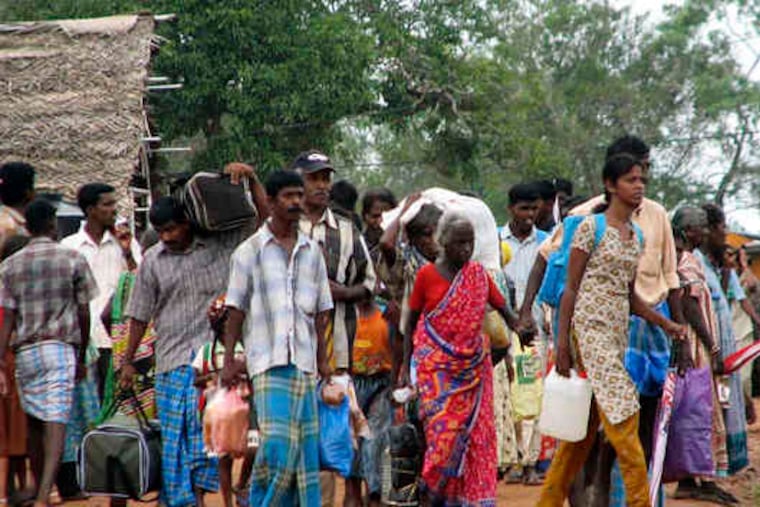Refugees struggle to rebuild
Tens of thousands in postwar Sri Lanka live with uncertainty.

BATTICALOA, Sri Lanka - Three years ago, Vairamuttu Bavani left her home in eastern Sri Lanka to attend her cousin's wedding in the north.
She didn't make it back until September this year.
Trapped by the civil war, Bavani, a Tamil, lost six members of her family and both her legs to a bomb. She spent months detained in an overcrowded refugee camp.
Even now, she remains under tight scrutiny by local authorities, who have visited her almost every day since her return from the northern Vanni region, she said.
"They ask me where I went in the Vanni and what I was doing there," said Bavani, 25, who spends her days seated on the floor of her sister's house, fighting boredom.
Bavani is among tens of thousands of refugees struggling to rebuild their lives in postwar Sri Lanka, under tight government control.
During the final months of the war, which raged mainly in Tamil areas in the country's east and north, nearly 300,000 civilians were trapped between Tamil Tiger rebels and advancing government troops. These refugees, mostly Tamils, are now in various states of uncertainty.
The quarter-century war cost 80,000 to 100,000 lives, as the rebels fought for a separate state for Sri Lanka's Tamil minority. After the rebels lost in May, the government herded civilians, along with some straggling rebels, into overcrowded camps.
Rights groups and Western governments decried conditions in the camps, saying they amounted to illegal collective punishment.
Under international pressure, the government has vowed to close the camps by the end of January.
Even those allowed to return home say they have been told not to travel without police permission. Security officers regularly visit their homes. Many wait for news of loved ones who vanished or were known to be taken by the military for questioning.
Rights groups fear the government's surveillance of refugees and its failure to provide them with livelihoods will reignite ethnic tensions.
"It's alienating the 300,000 displaced and their relatives," said Meenakshi Ganguly, a researcher at Human Rights Watch. "They're all going to feel like they're living in a state where they are not trusted and don't belong."
Sri Lanka's mostly Hindu Tamils, 18 percent of the country's 20 million people, have complained of decades of discrimination at the hands of the Sinhalese majority, which is mostly Buddhist.
Rishard Badurdeen, Sri Lanka's resettlement minister, said refugees are getting support from the government and charities.
Refugees being resettled in the north, swathes of which were flattened during the final battles, are getting tin sheets from neighboring India to help rebuild their homes, 25,000 rupees ($219) in cash from UNHCR and six months of dry rations from the World Food Program, he said. Farmers also get agriculture grants, he said.
Many refugees bear hatred for the Tamil Tigers as well.
They say rebels shot civilians who tried to flee the war zone and stole their children to replenish the ranks of dying fighters. UNICEF has accused the rebels of forcibly conscripting 6,000 children.
"Raising children in that area was like raising cattle and sending them to slaughter," said Sugadas Rajvathani, 34, who in October returned to her sister's house in Trincomalee, a port town in northeastern Sri Lanka.
When rebels came, she hid her children in ditches, placing a metal sheet and a cooking pot on top for camouflage.
One night, rebels came to a tent next to theirs and shot dead a man who tried to keep them from taking his son, she said. The boy, enraged, began to shout: "Let's teach them a lesson!" Rajvathani recalled.
The villagers took up sticks and hoes to fight. In the commotion, Rajvathani and her family fled across a lagoon to government territory.
There was shelling from both sides, she said. The woman in front of her was hit and slipped beneath the water. "We had to ignore bodies falling in front of us and walk on," she said.
She is glad to be home. Surrounded by solid walls and a dozen members of her family, she can't stop grinning.
But no one has any income. The family is living off 30,000 rupees ($263) she got from pawning two gold bangles.
Even here in the east, where fighting ended two years ago, few find economic opportunities when they return, especially women.
Sasikala Sivaraja and her husband left their small village outside Batticaloa in 2006, going north in search of work. She came home in August. Her husband didn't. Now she and her two daughters live off food rations and her sister's largesse.
Job prospects for Bavani are even worse.
She once had planned to attend a sewing class offered by a local church. Now she doesn't know what to do.
"The machines are all operated with the legs," she said.